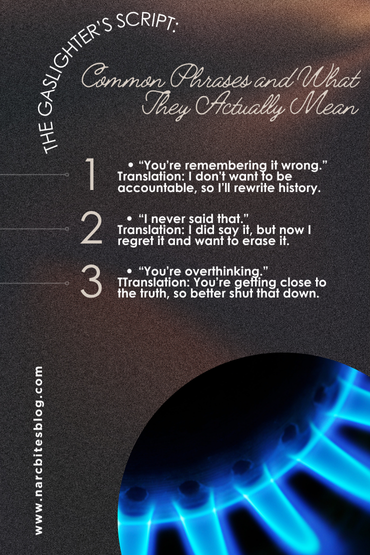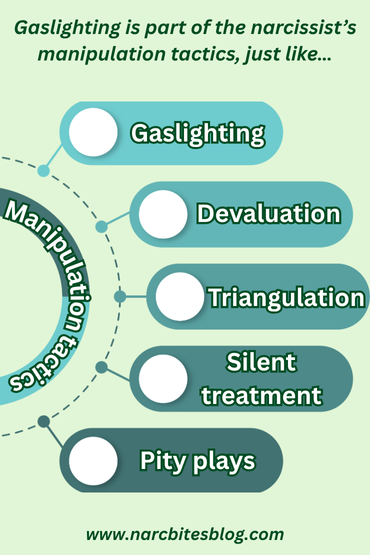Do you find yourself apologizing even when you know you are not wrong? Do you start questioning your memory, replaying conversations in your head and wondering if you imagined things? Does it keep happening until you begin to doubt what is real? That is not just confusion. It is one of the most insidious psychological tactics in a narcissist’s toolbox: gaslighting.
Gaslighting is often thrown around as a trendy word for toxic behavior, but in the hands of a narcissist it is far more serious. It is a deliberate attack on your reality, your confidence and your sense of self.
Let’s look at how this tactic works, why it is so effective and what it does to the people who live under its influence.
What Gaslighting Really Is and Why It’s So Dangerous
Gaslighting is more than lying. It’s lying with the intention of destabilizing you. It’s not about hiding the truth — it’s about making you doubt your ability to recognize it.
A narcissist doesn’t just deny what happened. They twist it. Distort it. Retell it in a way that paints you as the problem. They say things like:
“You’re too sensitive.”
“I never said that.”
“Wow, you really remember things wrong, don’t you?”
“You’re imagining things again.”
And after enough of this, you stop trusting your gut. You stop trusting your memory. Eventually, you start thinking, “Maybe it is me. Maybe I’m too much. Maybe I’m broken.”
That’s not an accident. That’s the design.
The Narcissist’s Need for Control: Why Gaslighting Works So Well
At the core of every narcissist is a fragile ego desperately seeking validation and control. And guess what? Controlling someone else’s perception of reality is the most efficient way to feel powerful — without having to change a single thing about themselves.
Gaslighting allows the narcissist to rewrite the past. Not just to avoid accountability, but to condition you to accept mistreatment. It’s part of a broader narcissistic manipulation strategy that includes:
- Devaluation disguised as “concern”
- Triangulation that makes you feel replaceable
- Silent treatments that punish you for having needs
- Pity plays to make them the victim when you finally protest
But gaslighting? That’s the string that ties it all together. It’s the glue. Because when you no longer trust your own thoughts, you become dependent on theirs.
Living Inside the Fog: The Psychological Effects of Gaslighting
When you’re caught in a gaslighting dynamic, it feels like living in a fog — not the dreamy kind, but the kind where nothing is clear and you can’t see two feet ahead.
You second-guess yourself constantly. You rehearse every conversation before you speak. You journal just to make sure you didn’t invent what happened the night before. You apologize out of habit, not guilt.
Over time, this creates:
Emotional confusion: you don’t know how to feel because every feeling gets questioned.
Anxiety and hypervigilance: you start anticipating blowups before they even happen.
Low self-worth: if your thoughts are “wrong,” if your feelings are “too much,” what’s left to believe in?
Cognitive dissonance: you know something’s wrong, but the person gaslighting you keeps insisting everything’s fine — and that you’re the one who’s unwell.
And the cruel twist? The worse you feel, the more you rely on the narcissist to “fix” it — the very person breaking you is now your only source of comfort.
Why It’s So Hard to See It — Until It’s Too Late
One of the most vicious parts of gaslighting is how invisible it is from the inside. Victims often describe it as “death by a thousand paper cuts.” Nothing seems big enough to call abuse — until you look back and realize you’re emotionally unrecognizable.
Why is it so hard to detect?
- Because it starts small. A comment here, a contradiction there.
- Because the narcissist often mixes abuse with affection. One minute they’re dismissing you, the next they’re hugging you.
- Because they isolate you — subtly, but effectively. You stop sharing with others out of shame or exhaustion.
- Because they convince you that you’re the unstable one.
And if you’re someone who tends to see the best in people — who wants to believe in love, in redemption, in second chances — you are exactly who they’re looking for.
 The Gaslighter’s Script: Common Phrases and What They Actually Mean
The Gaslighter’s Script: Common Phrases and What They Actually Mean
Here are some of the greatest hits from the narcissist’s gaslighting playbook — and what’s actually being communicated underneath:
- “You’re remembering it wrong.”
Translation: I don’t want to be accountable, so I’ll rewrite history. - “You’re being dramatic.”
Translation: Your emotions make me uncomfortable, so I’ll discredit them. - “I never said that.”
Translation: I did say it, but now I regret it and want to erase it. - “You’re overthinking.”
Translation: You’re getting close to the truth — better shut that down.
These phrases seem harmless in isolation. But over time, they become a kind of psychological poison — slowly convincing you that your internal compass is broken.
The Trauma Gaslighting Leaves Behind
Even after you leave a narcissistic relationship, the echoes of gaslighting don’t just vanish. You may find yourself:
- Struggling to make decisions
- Feeling guilt for things that weren’t your fault
- Asking others to confirm your memories
- Feeling like you’re “too sensitive” or “too much” in new relationships
- Expecting punishment for setting boundaries
This is more than insecurity. It’s psychological injury — trauma that gets coded into your nervous system. Some survivors describe it as a kind of identity crisis: Who even am I, if everything I believed about myself was filtered through someone else’s distortion?
Breaking the Spell: How to Start Reclaiming Your Reality
The antidote to gaslighting is not just truth — it’s trust. Specifically, trusting your own internal world again.
Here’s what that looks like in real life:
- You start naming things. “That felt invalidating.” “That didn’t happen the way you said.” Language is power.
- You write things down. Not because you’re paranoid, but because you’re reclaiming the facts.
- You stop apologizing for existing. For taking up space. For feeling angry. For needing clarity.
- You get outside perspective. A therapist. A trusted friend. A journal. Anything that helps you re-anchor in reality.
- You allow discomfort. Calling out gaslighting might make the narcissist lash out — but it also breaks the cycle.
And most importantly: you stop asking them to validate your experience. You don’t need their permission to believe your truth.
It Was Never About the Facts — It Was Always About Your Mind
Gaslighting doesn’t survive because the facts are unclear — it survives because you were trained to abandon your own clarity.
You start feeling like your reality is a liability. Like trusting your own perception is somehow selfish. You get praised when you let things go, when you “don’t make a big deal out of nothing,” when you let them rewrite the story — again.
That’s the psychological trap: the narcissist teaches you that emotional peace only comes from compliance. And after a while, peace starts to look like silence. Like shrinking. Like losing.
But here’s what no one tells you: regaining your reality is going to feel wrong at first. Like confrontation. Like betrayal. Like you’re suddenly the aggressor. Because that’s how thoroughly you’ve been taught that your truth is dangerous.
The Body Remembers, Even When the Mind Doubts
It’s easy to think of gaslighting as something that happens in your head — but it lives in your body, too.
It’s in the way your shoulders tense when you’re asked “what’s wrong.”
It’s in the shallow breathing when someone questions your version of events.
It’s in the tightness in your chest when you think, “What if I’m the problem?”
Survivors often describe it like a phantom weight. The narcissist is gone, but the gravity remains. You carry yourself like you still owe someone an apology you never should have given.
So recovery isn’t just cognitive. It’s somatic. It’s learning to live in a body that no longer flinches every time you speak your truth.
What Healing Actually Looks Like
Healing from gaslighting is rarely straightforward, and it has little to do with the polished narratives you see on Instagram. It is a gradual process of sorting through what happened and learning to separate facts from the distortions you were fed.
The shift comes when you stop negotiating with those distortions. When you respond based on what you know rather than what you are told to believe.
Gaslighting leaves psychological injuries, not personality flaws. Recovery is not about proving anything to the person who manipulated you. It is about rebuilding the ability to trust your own judgment and memory.
Let me suggest a workbook that isn’t about the past. It’s about the future. Not about them, but about you.
Find your way back to yourself at last.

